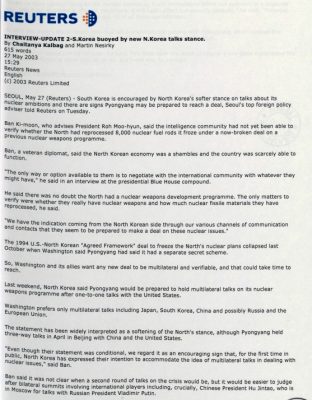INTERVIEW-UPDATE 2-S.Korea buoyed by new N.Korea talks stance.
[Reuters]
Published date: 27th May 2003
27 May 2003
Reuters News
English
(c) 2003 Reuters Limited
SEOUL, May 27 (Reuters) – South Korea is encouraged by North Korea’s softer stance on talks about its nuclear ambitions and there are signs Pyongyang may be prepared to reach a deal, Seoul’s top foreign policy adviser told Reuters on Tuesday.
Ban Ki-moon, who advises President Roh Moo-hyun, said the intelligence community had not yet been able to verify whether the North had reprocessed 8,000 nuclear fuel rods it froze under a now-broken deal on a previous nuclear weapons programme.
Ban, a veteran diplomat, said the North Korean economy was a shambles and the country was scarcely able to function.
“The only way or option available to them is to negotiate with the international community with whatever they might have,” he said in an interview at the presidential Blue House compound.
He said there was no doubt the North had a nuclear weapons development programme. The only matters to verify were whether they really have nuclear weapons and how much nuclear fissile materials they have reprocessed, he said.
“We have the indication coming from the North Korean side through our various channels of communication and contacts that they seem to be prepared to make a deal on these nuclear issues.”
The 1994 U.S .- North Korean “Agreed Framework” deal to freeze the North’s nuclear plans collapsed last October when Washington said Pyongyang had said it had a separate secret scheme.
So, Washington and its allies want any new deal to be multilateral and verifiable, and that could take time to reach.
Last weekend, North Korea said Pyongyang would be prepared to hold multilateral talks on its nuclear weapons programme after one-to-one talks with the United States.
Washington prefers only multilateral talks including Japan, South Korea, China and possibly Russia and the European Union.
The statement has been widely interpreted as a softening of the North’s stance, although Pyongyang held been widely int three-way talks in April in Beijing with China and the United States.
“Even though their statement was conditional, we regard it as an encouraging sign that, for the first time in public, North Korea has expressed their intention to accommodate the idea of multilateral talks in dealing with nuclear issues,” said Ban.
Ban said it was not clear when a second round of talks on the crisis would be, but it would be easier to judge after bilateral summits involving international players including, crucially, Chinese President Hu Jintao, who is in Moscow for talks with Russian President Vladimir Putin.
Roh will visit China in July and then Russia, he said.
Ban said China had played a vital role in bringing North Korea to the table and had changed ties with Pyongyang to normal state-to-state relations rather than preferential.
Ban said the North Korean security crisis had a direct bearing on the South’s economy, the fourth-largest in Asia.
“When we have tension rising on the Korean peninsula, it will immediately affect our economy in a negative way. And if our economy is affected negatively, it will again affect our security capacity,” he said. “Potential Investors will shy away … We need to get rid of all these uncertainties.”
He said last week’s North-South talks had set a precedent for dealing with Pyongyang, which opened the meeting with a tirade against Roh’s summit with U.S. President George W. Bush.
The first round lasted just 18 minutes, he said. Two days later the North produced a two-page explanation the South felt sufficient to allow talks to go on, but there was no apology.






